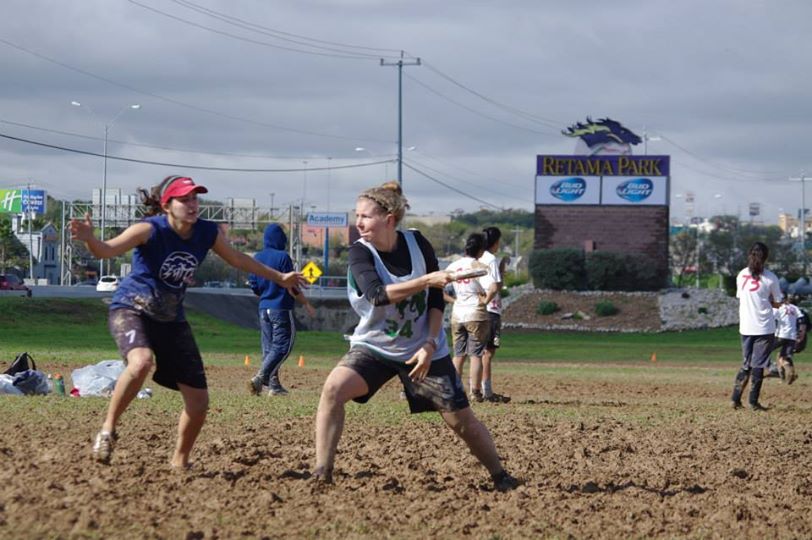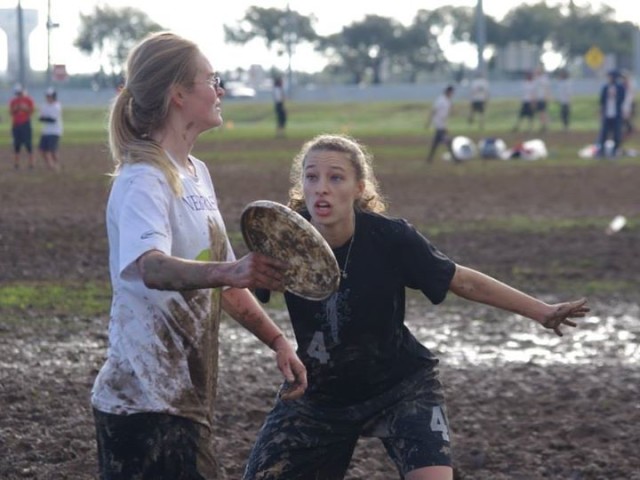 Wisconsin's Marissa Paulson looks to advance the disc at 2015 Centex vs. sMITe. Photo credit: Molly Berkholtz
Wisconsin's Marissa Paulson looks to advance the disc at 2015 Centex vs. sMITe. Photo credit: Molly Berkholtz
My biggest concern right now is that the field conditions at Centex will leave the nearly 50 college women’s teams wondering: “Why did we come here?”
For most teams, it is about playing top-notch competition. For other teams, like those in Tier 2 and 3, Centex is about creating opportunities for teams who might not get them otherwise. My college team lost for three consecutive years in the back door game-to-go. Attending Centex was a huge reason we were able to close the point differential and actually compete against a team like Carleton Syzygy by the time I graduated. The opportunities that Centex creates mattered a whole lot to me and to my teammates.
My co-captain and I received an email inviting us to attend Centex in 2009. We brought it up at practice, expecting our teammates to reject it because it would cost too much money and require traveling too far. Rather, the invite filled them with excitement and a goal to work towards. Not only did we want to go to Centex — we also wanted to come out with a winning record. In northwestern Wisconsin, having a tangible goal that could come to fruition before May was huge. It kept us motivated during the long indoor season, from going to the track and working out to bonding as a team over dance-off practices.
We were seeded 30th and we won our pool. We lost our crossover against Pittsburgh, but it was a huge motivator for us when we returned to Eau Claire to throw outside despite the sub-zero conditions and snow on the ground. Even though we ultimately finished 4-4 and took 27th, we still broke seed against the best opponents with whom we could compete outside of the game-to-go. We don’t often have opportunities to practice playing with observers, or play many games where we had a chance at winning if we made adjustments. These opportunities were huge in growing our program and developing strategies.
In 2010, during my final season with Wisconsin-Eau Claire SOL, we accepted our invitation with vengeance. We were ready to make it to the top and earn the right to play top elite teams. Seeded 17th, we won our pool and were ready to win a crossover game. We beat UCLA, one of the teams we had drooled over reading about in the UPA Magazine for years. We finally believed we could do it. Maybe this was the year that Nationals could happen.
In championship bracket play, we went up 4-1 against Oregon. Yes, the same Oregon that would win a National Championship in 2010. We started out on fire; Fugue fought back. We made adjustments and continued to match their intensity. Even though we fell 10-13, SOL put together one of the best games I have ever had the opportunity to play in as a college ultimate player. That is the warmest moment I have when I look back to college.
The very next game, we beat UC-Santa Barbara on universe point. You might remember them as the other team that played in the 2010 National Championship. Here’s our team that had never qualified for Nationals, and for the weekend, we had earned the honor to play against the finalists in the same morning.
That year, we also put together something I never ever thought I could ever be part of: winning the Centex Dance-off. For the teams that do not participate, it’s about more than dancing. It’s about building camaraderie between teams and empowering women to have fun and love themselves no matter what. In an era where the competition on the field is fiercer than ever at the college women’s level, it is even more important we build those relationships. Without them, the teams on the bubble do not have the opportunity to get over the hump.

Emily Lander of Nebraska looks upfield against Lorraine Guerin from Wisconsin. Photo credit: Molly Berkholtz
This year, I had the privilege to coach the Wisconsin Bella Donna team to its best sanctioned tournament finish thus far. We finished 5-1 this weekend and overcame conditions and tough opponents that pushed us to adjust, adapt, stay positive, and grow. This experience will bond us with other teams and strengthen the connections we have with each other. We focused on mental toughness and executing regardless of the rain, mud, wind, opponent, etc. We are better prepared for I-85 Rodeo, Lake Superior Conferences, and North Central Regionals as a result.
I do not think I am alone in strongly believing that the teams and players at the top of the game have an obligation to share their abilities and knowledge with other teams and players who are working to get better. Centex matters because it is a tangible, in-season venue to create these opportunities and build connections and relationships to pass information. It allows teams to access elite competition, on the field as opponents and off the field as a spectator. Centex provides opportunities to grow, learn, and connect better than any other opportunity that exists in college women’s ultimate today.








Comments Policy: At Skyd, we value all legitimate contributions to the discussion of ultimate. However, please ensure your input is respectful. Hateful, slanderous, or disrespectful comments will be deleted. For grammatical, factual, and typographic errors, instead of leaving a comment, please e-mail our editors directly at editors [at] skydmagazine.com.